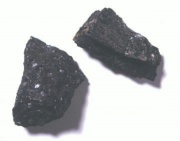Difference between revisions of "Hornblende"
Jump to navigation
Jump to search
| (2 intermediate revisions by 2 users not shown) | |||
| Line 1: | Line 1: | ||
| − | [[File:34.201-20-17.jpg|thumb|]] | + | [[File:34.201-20-17.jpg|thumb|Cylinder seal<br>MFA# 34.201]] |
== Description == | == Description == | ||
| − | + | [[File:Amphibolehornblendemr.jpg|thumb|Hornblende]] | |
A dark-green to black mineral composed of calcium magnesium iron and hydroxyl aluminosilicate. Hornblende is a metamorphic rock and can be mixed with [[feldspar]], [[quartz]] or [[mica]] to form [[granite]]. It also occurs as dark crystals in [[marble]]. Hornblende deposits are located in near Mount Vesuvius and in Norway, Sweden, Italy, Canada (Ontario) and the United States (Massachusetts, New Hampshire, New Jersey, New York). Hornblende usually grows in hexagonal prismatic crystals that form long needles or columns. | A dark-green to black mineral composed of calcium magnesium iron and hydroxyl aluminosilicate. Hornblende is a metamorphic rock and can be mixed with [[feldspar]], [[quartz]] or [[mica]] to form [[granite]]. It also occurs as dark crystals in [[marble]]. Hornblende deposits are located in near Mount Vesuvius and in Norway, Sweden, Italy, Canada (Ontario) and the United States (Massachusetts, New Hampshire, New Jersey, New York). Hornblende usually grows in hexagonal prismatic crystals that form long needles or columns. | ||
| − | |||
| − | |||
== Synonyms and Related Terms == | == Synonyms and Related Terms == | ||
| Line 10: | Line 8: | ||
greenstone; horneblenda (Port.); Hornblende (Deut.); hoornblende (Ned.) | greenstone; horneblenda (Port.); Hornblende (Deut.); hoornblende (Ned.) | ||
| − | == | + | == Physical and Chemical Properties == |
| − | |||
| − | |||
| − | |||
| − | |||
| − | Luster = vitreous to silky. Streak = colorless. Brittle with uneven or splintery fracture. | + | * Monoclinic with prismatic crystals. |
| + | * Perfect cleavage in two directions (56 and 124 degrees). | ||
| + | * Pleochroic (green or brown to colorless or yellow). | ||
| + | * Luster = vitreous to silky. | ||
| + | * Streak = colorless. | ||
| + | * Brittle with uneven or splintery fracture. | ||
{| class="wikitable" | {| class="wikitable" | ||
| Line 27: | Line 26: | ||
|- | |- | ||
! scope="row"| Density | ! scope="row"| Density | ||
| − | | 2.9-3.4 | + | | 2.9-3.4 g/ml |
|- | |- | ||
! scope="row"| Refractive Index | ! scope="row"| Refractive Index | ||
| Line 33: | Line 32: | ||
|} | |} | ||
| − | == | + | ==Resources and Citations== |
* Robert Fournier, ''Illustrated Dictionary of Practical Pottery'', Chilton Book Company, Radnor, PA, 1992 | * Robert Fournier, ''Illustrated Dictionary of Practical Pottery'', Chilton Book Company, Radnor, PA, 1992 | ||
| Line 41: | Line 40: | ||
* R.F.Symmes, T.T.Harding, Paul Taylor, ''Rocks, Fossils and Gems'', DK Publishing, Inc., New York City, 1997 | * R.F.Symmes, T.T.Harding, Paul Taylor, ''Rocks, Fossils and Gems'', DK Publishing, Inc., New York City, 1997 | ||
| − | * ''Encyclopedia Britannica'', http://www.britannica.com Comment: "hornblende" | + | * ''Encyclopedia Britannica'', http://www.britannica.com Comment: "hornblende" [Accessed December 4, 2001]. |
* C.W.Chesterman, K.E.Lowe, ''Audubon Society Field Guide to North American Rocks and Minerals'', Alfred A. Knopf, New York, 1979 | * C.W.Chesterman, K.E.Lowe, ''Audubon Society Field Guide to North American Rocks and Minerals'', Alfred A. Knopf, New York, 1979 | ||
| − | * Wikipedia | + | * Wikipedia: http://en.wikipedia.org/wiki/Hornblende (Accessed Sept. 7, 2005) |
* ''Van Nostrand's Scientific Encyclopedia'', Douglas M. Considine (ed.), Van Nostrand Reinhold, New York, 1976 | * ''Van Nostrand's Scientific Encyclopedia'', Douglas M. Considine (ed.), Van Nostrand Reinhold, New York, 1976 | ||
Latest revision as of 14:11, 9 September 2022
Description
A dark-green to black mineral composed of calcium magnesium iron and hydroxyl aluminosilicate. Hornblende is a metamorphic rock and can be mixed with Feldspar, Quartz or Mica to form Granite. It also occurs as dark crystals in Marble. Hornblende deposits are located in near Mount Vesuvius and in Norway, Sweden, Italy, Canada (Ontario) and the United States (Massachusetts, New Hampshire, New Jersey, New York). Hornblende usually grows in hexagonal prismatic crystals that form long needles or columns.
Synonyms and Related Terms
greenstone; horneblenda (Port.); Hornblende (Deut.); hoornblende (Ned.)
Physical and Chemical Properties
- Monoclinic with prismatic crystals.
- Perfect cleavage in two directions (56 and 124 degrees).
- Pleochroic (green or brown to colorless or yellow).
- Luster = vitreous to silky.
- Streak = colorless.
- Brittle with uneven or splintery fracture.
| Composition | (Ca,Na)2-3(Mg,Fe,Al)5(Al,Si)8O22(OH,F)2 |
|---|---|
| Mohs Hardness | 5.0 - 6.0 |
| Density | 2.9-3.4 g/ml |
| Refractive Index | 1.615 - 1.730 |
Resources and Citations
- Robert Fournier, Illustrated Dictionary of Practical Pottery, Chilton Book Company, Radnor, PA, 1992
- Frank A. Lent, Trade names and Descriptions of Marbles, Limestones, Sandstones, Granites and Other Building Stones Quarried in the United States Canada and other Countries., Stone Publishing Co, New York, 1925
- R.F.Symmes, T.T.Harding, Paul Taylor, Rocks, Fossils and Gems, DK Publishing, Inc., New York City, 1997
- Encyclopedia Britannica, http://www.britannica.com Comment: "hornblende" [Accessed December 4, 2001].
- C.W.Chesterman, K.E.Lowe, Audubon Society Field Guide to North American Rocks and Minerals, Alfred A. Knopf, New York, 1979
- Wikipedia: http://en.wikipedia.org/wiki/Hornblende (Accessed Sept. 7, 2005)
- Van Nostrand's Scientific Encyclopedia, Douglas M. Considine (ed.), Van Nostrand Reinhold, New York, 1976
- Random House, Webster's Encyclopedic Unabridged Dictionary of the English Language, Grammercy Book, New York, 1997
- The American Heritage Dictionary or Encarta, via Microsoft Bookshelf 98, Microsoft Corp., 1998
- CRC Handbook of Chemistry and Physics, Robert Weast (ed.), CRC Press, Boca Raton, Florida, v. 61, 1980 Comment: density=3.0

